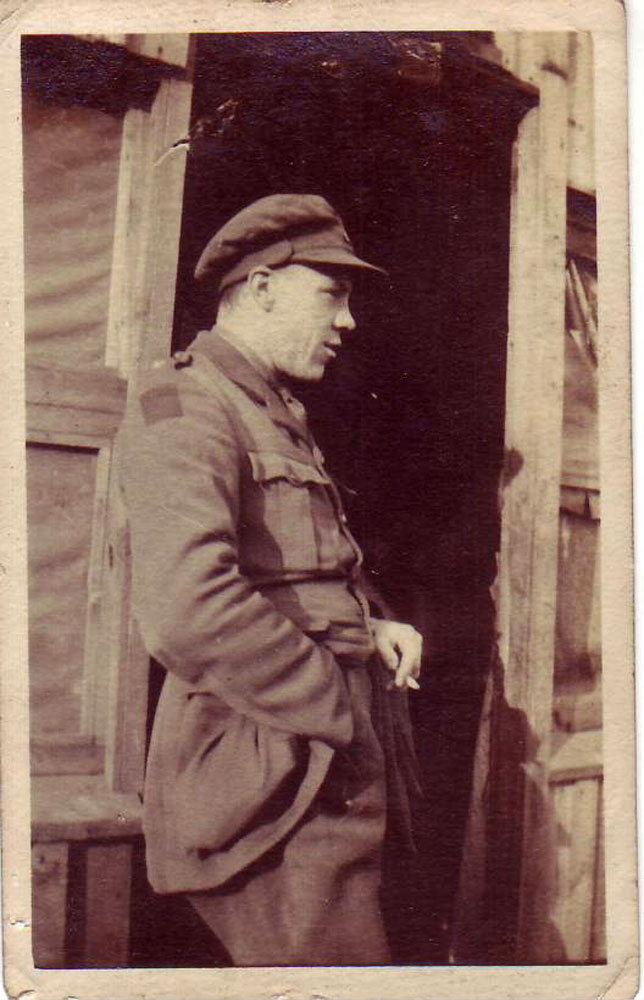
Lieutenant Thomas Ginger. Signals Officer. 4th Battalion.
Thomas Ginger was awarded the Military Cross as a result of his bravery during the German ‘Spring Offensive’ of March 1918. In the citation for his award it describes how ‘On the first day his senior Officers were killed and in numerous rear-guard actions he found himself in command of considerable bodies of men’.
One such example is during the retreat across the River Somme near Brie, when Ginger was ordered to take his men and cover the retreat of the remains of the 50th Division. He took his tired men to the far bank and took up positions to hold the advancing Germans back. At the same Lt George Begg, 239/Field Company was wiring the bridge that the retreating men were crossing. As German troops started to appear on the horizon and the last of the Durham Light Infantry crossed the bridge, Begg primed the detonator and pressed the plunger home. Nothing happened. This was repreated three times. When the bridge did blow, Begg looked across the river to see Ginger and his men still focusing fire on their foe. Eventually Ginger managed to construct a rudimentary footbridge, allowing his men to cross to safety.
Explore more memories from the ribbon
-
Catherine Walls
Valerie Slater of Coverdale provided this story about her grandmother, Catherine Walls – a happy and unusual tale wherein all 5 of her sons survived the Great War. In 1883, Catherine Louisa Polden, then living in Dorset set eyes on George Walls for the first time. It was love at first sight. George was twenty years older than Catherine and arranged the wedding with all haste – the marriage by licence took place at Hampreston near Wimborne. Catherine left the county of her birth, never to return. After journeying north, Catherine and George made their home in Carlton at Coverdale Cottage. The couple had three daughters and five sons born between 1886 and 1898. George died in 1908 so Catherine had to face the anxious war years supported by her daughters. She was a religious woman, so her faith combined with her respected and busy life as unofficial midwife in the village helped her to get through. Her prayers were answered. William Walls (born 1898) served in the Machine Gun Corps; George (born 1889) was with 21st Kings Royal Rifles, being wounded by shrapnel at the Battle of Flers-Courcelet on 17 September 1916; Alfred (born 1891) served in the Army Service Corps and then the Loyal North Lancashire Regiment, he was hospitalised twice (the second occasion being the result of a gas attack); Joe (born 1896) enlisted with the King’s Royal Rifle Corps with his brother Dick. Joe was discharged from the army in November of 1916 due to ill…
-
J W Horn
John was born in 1896 in Leyburn North Yorkshire. In 1900 the family moved to Burtersett near Hawes where John’s father Jeremiah worked as a stonemason at the local quarry. John had two younger brothers, Anthony and George. On leaving school John also worked at the quarry. In February 1916 he had married a local girl, Jane Ann Dinsdale. By the time of his wedding John was with the 4th Battalion The Yorkshire Regiment, having enlisted at Askrigg in October 1915. John embarked for France in April 1916. The Battalion would not take part in the Somme offensive until September 15th with the eventual plan for the 26th was for the Battalion to attack and capture German trenches running from Flers. It was during the German counter attack that the Battalion suffered heavy casualties, one of which was John. His body was never found and it wasn’t until early 1917 that his wife Jane was officially notified that her husband had been killed. By the time of his death Jane had given birth to a child. Private John William Horn’s name is commemorated on the Thiepval Memorial.
-
William Whitesmith Constantine
William was born in Middlesbrough on the 26th March 1887. He was the son of Joseph and Maria Constantine of Harlesly Hall Northallerton. He was one of five offspring, having 2 sisters and 2 brothers. His father ran a shipping company which he had started in 1885 and would last until it was sold off in 1960. At the outbreak of WW1 the company had 28 vessels, 22 being ocean going and 6 coastal. During the war 13 of the company vessels and 32 crewmen would perish. William was gazetted into the Yorkshire Regiment as a 2nd Lieutenant in March 1906, promoted to Lieutenant 27th May 1907, and to Captain 5th October 1913. He served in France with the 4th Battalion. He suffered gassing at Ypres on the 24th May 1915 and was wounded on the Somme on the 15th September 1916. In 1916 he was awarded the Military Cross for ‘conspicuous gallantry in action’ which was cited in the London Gazette on the 14th November 1916. He had been promoted to Major on the 13th June 1916. On the 2nd May 1918 he was posted to The 2nd Battalion the Yorkshire Regiment, then in August to the 9th Battalion the King’s Own Yorkshire Light Infantry. The family were associated with Constantine College in Middlesbrough having donated £40,000 towards the building cost. The college opened in 1930. William died on the 11th November 1970 and was buried at the Church of St. Oswald, East Harlsey where he had been Churchwarden…
